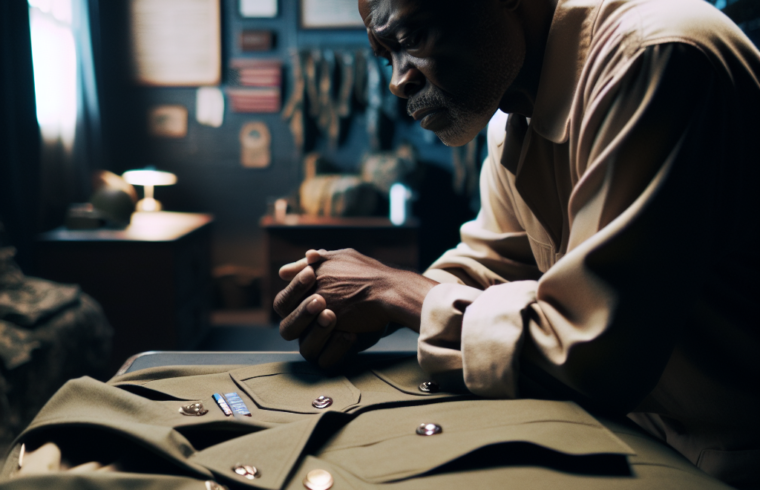==> Thank you for reading this post! Click Here If you are looking for support and Victory over PTSD.
Understanding the Impact of Military Trauma
Recognizing Unresolved Trauma
It’s super important to grasp what unresolved military trauma really means. In my own experience, trauma doesn’t just go away. It lingers, often silently influencing our lives. Sometimes you might notice it impacting relationships or daily activities, but pinpointing it can feel like hunting for buried treasure amidst a sea of chaos.
Many vets might think, “Hey, I’m tough—I can handle this!” But the reality is that being brave doesn’t mean ignoring pain. It took me a while to realize that acknowledging trauma was my first step towards healing. Embracing that recognition is like shining a light in a dark room; it reveals what we need to confront.
So, if you’re feeling jumped up by things that should be comforting—like a family gathering or a quiet night out—take a moment. This might be your mind’s way of saying something’s unresolved, and that’s completely okay.
Seeking Professional Help
Finding the Right Specialist
When I finally decided to seek help, I quickly realized that not all therapists are equipped to handle military trauma. It’s key to find someone who understands the unique experiences veterans face. I began to ask around, checking online directories, and even contacting local veteran organizations for recommendations.
Once I had a few names, I didn’t hesitate to make calls and ask questions. How familiar are they with military issues? What’s their approach to therapy? It’s all about finding someone who resonates with you. Trust me, having the right fit makes all the difference.
Finally, after some trial and error, I found a therapist who had experience working with veterans. That relationship became a vital part of my healing journey. It’s all about finding your person, someone who gets it.
Building a Support Network
Connecting with Fellow Veterans
There’s something incredibly powerful about sharing experiences with fellow veterans. They get it in a way that civilians often can’t. I joined a local support group, and it felt like being welcomed into a family that truly understands the complexities of military service.
These connections can create a safe space where nobody judges. You’ll find that your struggles resonate with their stories, and sharing can lighten that heavy load. By talking openly about our experiences, I discovered I wasn’t alone, which was one of the most comforting realizations.
Networking also often leads to valuable resources, such as workshops and social events. You never know who you’ll meet or what insightful advice they might throw your way.
Practicing Self-Care and Mindfulness
Establishing Healthy Routines
Self-care isn’t just a buzzword; it’s a crucial part of dealing with trauma. Personally, I had to seriously rethink my daily routines and what I was putting in my body. I started small—adding more greens to my meals and trying to schedule some downtime into my day.
Get Support and Help with Recovery! Visit us for more Information and Support
I also learned that exercise isn’t just about building muscle. It’s therapeutic! Whether it’s a brisk walk or a good run, getting active helps clear the mental fog. I felt more grounded and present after hitting the trail, even if at first I was dragging my feet to get there.
Mindfulness techniques like meditation can also make a world of difference. I began incorporating a few minutes of focused breathing or guided meditation into my mornings. The calm after these sessions is something I now look forward to—it’s like checking in with my mental health before diving into the day.
Emphasizing Communication and Expression
Journaling as a Tool
Writing has always been a mixed bag for me. But I found that keeping a journal turned out to be one of the most effective tools for processing my emotions. It was like unloading a heavy backpack—it felt relieving writing down thoughts I hadn’t voiced before.
Through journaling, I began to dissect my feelings and experiences, helping me make sense of what I was going through. It became a safe space for raw expression without fear of judgment. Honestly, some days, I’d just scribble down whatever was floating around in my head, and that act itself brought clarity.
I also experimented with poetry and letter-writing to express emotions I found difficult to share verbally. It’s okay to let the ink flow—think of it as a conversation with the self. You never know what insights will emerge from the process!
FAQs
1. What are the signs of unresolved military trauma?
Signs can vary but may include anxiety, emotional numbness, flashbacks, difficulty in relationships, or heavy use of substances. If you feel like something just isn’t right, it’s worth exploring these feelings further.
2. How can I find a therapist specialized in military trauma?
Start by reaching out to veteran organizations or use online directories that focus on mental health professionals. Your local VA center can also provide valuable resources and referrals.
3. What should I include in my self-care routine?
Focus on balanced nutrition, regular exercise, sufficient sleep, and relaxation techniques like meditation. It’s about finding what makes you feel good and incorporating that regularly.
4. How can connecting with other veterans help?
Connecting with fellow veterans can provide a sense of belonging, understanding, and camaraderie. Sharing experiences can often feel cathartic and offer invaluable insights into your own journey.
5. Is journaling truly beneficial for healing from trauma?
Absolutely! Journaling allows you to articulate emotions that might be hard to voice and helps provide clarity. It serves as a safe outlet for reflecting on experiences, promoting self-discovery and healing.













